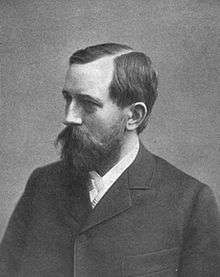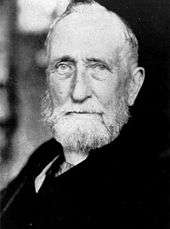Hans Delbrück
| Hans Delbrück | |
|---|---|
 Hans Delbrück | |
| Born |
Hans Gottlieb Leopold Delbrück 11 November 1848 Rügen, Bergen |
| Died |
14 July 1929 (aged 80) Berlin |
| Occupation | Historian |
| Nationality | German |
| Subject | Military History |
Hans Delbrück (11 November 1848 – 14 July 1929) was a German historian. Delbrück was one of the first modern military historians, basing his method of research on the critical examination of ancient sources, and using auxiliary disciplines, like demography and economics, to complete the analysis and the comparison between different epochs to trace the evolution of military institutions.
Delbrück's writings are chiefly concerned with the history of the art of war, his most ambitious work being his Geschichte der Kriegskunst im Rahmen der politischen Geschichte (History of warfare in the framework of political history, four volumes, third edition published in 1920). Other works are Die Perserkriege und die Burgunderkriege (The Persian and Burgundian Wars, 1887), Die Strategie des Perikles erläutert durch die Strategie Friedrichs des Grossen (The strategy of Pericles described through the strategy of Frederick the Great, 1890) and Das Leben des Feldmarschalls Grafen Neithardt von Gneisenau (Life of Marshal Count Neithardt von Gneisenau, 1894).
Biography
Delbrück was born in Bergen on the island of Rügen, and studied at the universities of Heidelberg and Bonn. As a soldier, he fought in the Franco-Prussian War, after which, in 1874, he became for some years tutor to Prince Waldemar of the German imperial family, a brother of the future emperor, Wilhelm II.[1] He served in the Reichstag from 1882 to 1883,[2] and afterward, in 1883, he became an editor of the Preussische Jahrbücher, a noted political magazine. He assumed charge of this publication in 1889,[1] and kept working on it in that capacity until 1920.[3]
In 1885, he became professor of modern history in the University of Berlin, where his lectures were highly popular.[1] He was a member of the German Reichstag from 1884 to 1890.[4] Delbrück vigorously opposed the policy of the Prussian government in dealing with the Danes and the Poles, with the result that he was twice subjected to disciplinary penalties as a professor and therefore, in Prussia, a civil servant. But it was his main role as editor of Preussen Jahrbucher that provided a platform for a growing interest in Germany's diplomatic relationship with Russia.[5] This took the form of a roving commission to Herr Paul Rohrbacher to enquire about German opinion. The findings from the 1890s tours formed a racial policy of dismemberment of Russia by seizing Slavic territory that belonged to them. The controversialist Fritz Fischer argued that they were socialists forcing extremists into the hands of revolutionaries. At an early stage of World War I, he became pessimistic regarding the possibility of any real success for Germany except by military and political strategy and tactics of a purely defensive character. He was, on tactical rather than on moral grounds, a strenuous opponent of intensified submarine warfare, and did not conceal his conviction that the result of this method of warfare would ultimately be the intervention of America. He was a member of the German Delegation during the Versailles Peace Conference that ended World War I where he mainly endeavoured to prove that Germany could not be made solely responsible for the outbreak of war.[3] He died in Berlin.
He was the father of Max Delbrück, who did pioneering work in physics and also won the Nobel Prize in Physiology or Medicine in 1969.
Hypotheses

Delbrück's works tried to place military history in the framework of general history. He regarded warfare as a cultural feature of societies, subject to evolution and influenced by the economy and the political system. His works, however, were not translated into English for some time, hence his reputation among professional military theorists in English-speaking countries is not held in the same esteem or significance as Clausewitz.
Ancient warfare
Singular conclusions on ancient warfare challenged historiography in so far as he tried to show that the figures for armies in antiquity were inflated in the original sources, and that, contrary to what is stated in most writings, the winner in a battle usually had more troops than the loser. Consequently, he gave completely different interpretations to some of the most famous battles in history, like Marathon, Gaugamela, and Zama by concluding that Rome's vaunted advantage over "barbarians" rested, not so much in their discipline and refined tactics, but rather in their superior logistical support. The Romans were able to raise and maintain huge armies on the field, while the "barbarians" were unable to match their numbers. The theory aimed to criticize Germany's political class and practice of warfare which were under the heavy sway of nationalistic ideas at the time.
Medieval warfare
Regarding medieval warfare, Delbrück's findings were more controversial. He made a distinction between knights (mounted warriors) and cavalry (an organized mass of mounted troops), and regarded the medieval warrior as an independent fighter, unable to join others and form units with any decisive tactical significance. Their conclusions were tested by later scholars, in particular the Belgian historian J. F. Verbruggen.
Modern warfare
When moving into modern warfare, Delbrück showed his intellectual origins in Clausewitz making a distinction between two possible strategies respectively: 'exhausting' the enemy and 'throwing down' the enemy (in German, Ermattungsstrategie and Niederwerfungsstrategie; often mistakenly translated as 'attrition' and 'annihilation'). These were derived from Clausewitz's distinctions between strategies seeking limited objectives and strategies aimed at rendering one's opponent militarily helpless, the latter often confused with the concept of "Total War" advocated by Ludendorff and rejected by Delbrück during wartime. The choice depended on the nature of the political objectives and existing political and economic limitations, as well as on the correlation of force numbers. He applied this analytical tool to the wars of Frederick the Great, concluding that, due to their numerical inferiority, the Prussians had pursued a strategy of exhaustion. His overall treatment of the era was, however, disappointing, in partially overlooking the Spanish wars. Very critical of his country's strategic thinking he averred it would have been preferable to seek victory in the Eastern front, gain minor objectives on the West and then sue for peace. This was one example of the general principle maintained, that military and political manoeuvres should be integrated.
In fiction
In Mel Brooks's comedy Young Frankenstein, Doctor Frankenstein sends his assistant, Igor, to retrieve the brain of Hans Delbrück for transplant into Frankenstein's monster. The tag on the beaker containing the brain reads "scientist and saint," so it is debatable whether Brooks intended the actual historian or a fictional Delbrück.
In a clearer reference to the historical figure, in Mel Brooks's comedy The Producers: The Movie Musical, Hans Delbrück is the name of the man to whom Franz Liebkind sends a letter by carrier pigeon.
In Victor Serge’s novel Unforgiving Years (Les Années sans pardon) the character Herr Schiff—an old German professor loyal to the Nazi regime, demoralized and disoriented in war-ravaged Berlin in the closing days of the Second World War—rereads Hans Delbrück’s The History of Warfare: "Lately, it was true, the sense of most of what he read escaped him; but being incapable of inattention, the mechanical act of reading acted upon him like a sedative. His cheek cupped in his hand, he reread the works he admired out of duty." Hans Delbrück appears in the professor’s thoughts again while contemplating the meaning of the war as American soldiers overtake Berlin: "The Second World War was already down as a great historical tragedy—a quasi-mythological one—which neither Mommsen, Hans Delbrück, Gobineau, Houston Stewart Chamberlin, Oswald Spengler, or Mein Kampf could elucidate entirely…."
Works
Among the other works of Delbrück, besides those mentioned above, are:
- Historische und politische Aufsätze (1886)
- Erinnerungen, Aufsätze und Reden (1902)
- Die Polenfrage (1894)
- Numbers in History (1913)
- Regierung und Volkswille (1914)
- Bismarcks Erbe (1915)
- Krieg und Politik (1918)
- Kautsky und Harden (1920)
- Ludendorff, Tirpitz, Falkenhayn (1920)
- History of the Art of War, (1920) University of Nebraska Press; Reprint edition, 1990. Translated by Walter, J. Renfroe. 4 Volumes.
In his book Regierung und Volkswille (1914), Delbrück attempted a defence of the old system of government in Germany and Prussia with particular reference to its “dualism,” that is parliamentary representation and simultaneously a certain degree of autocracy on the part of the sovereign in Prussia and of the federated government in the empire. A succinct statement of Delbrück's views on Germany's responsibility for World War I and an English reply can be found in articles by Delbrück and J. W. Headlam-Morley in the Contemporary Review (March 1921).[3]
Journals
- Preuss Jahrbucher, vol.149, (Aug 1912)
- Die Differenzen der uber die Kriegsziele huben und druben, in Krieg und Politik, vol.1 (Sep 1914)
Notes
- 1 2 3
 Gilman, D. C.; Thurston, H. T.; Colby, F. M., eds. (1905). "Delbrück, Hans". New International Encyclopedia (1st ed.). New York: Dodd, Mead.
Gilman, D. C.; Thurston, H. T.; Colby, F. M., eds. (1905). "Delbrück, Hans". New International Encyclopedia (1st ed.). New York: Dodd, Mead. - ↑
 Rines, George Edwin, ed. (1920). "Delbrück, Hans". Encyclopedia Americana.
Rines, George Edwin, ed. (1920). "Delbrück, Hans". Encyclopedia Americana. - 1 2 3
 Chisholm, Hugh, ed. (1922). "Delbrück, Hans". Encyclopædia Britannica (12th ed.). London & New York.
Chisholm, Hugh, ed. (1922). "Delbrück, Hans". Encyclopædia Britannica (12th ed.). London & New York. - ↑
 Chisholm, Hugh, ed. (1911). "Delbrück, Hans". Encyclopædia Britannica (11th ed.). Cambridge University Press.
Chisholm, Hugh, ed. (1911). "Delbrück, Hans". Encyclopædia Britannica (11th ed.). Cambridge University Press. - ↑ Fischer, p.125
See also
References
Bibliography
- Bucholz, Arden (1985): Hans Delbrück and the German Military Establishment: War Images in Conflict, University of Iowa Press.
- Bucholz, Arden (1993): Hans Delbrück and Modern Military History - German Military Historian. Historian, Spring.
- Annelise Thimmer, (1935): Hans Delbruck als Kritiker der Wilhelmischen Epoche, Düsseldorf, pp. 111 ff.
External links
| Wikimedia Commons has media related to Hans Delbruck. |
| Wikisource has original text related to this article: |
- Works by or about Hans Delbrück at Internet Archive
- Works by Hans Delbrück at Hathi Trust
- (German) Delbrück's History of the Art of War ("Geschichte der Kriegskunst")